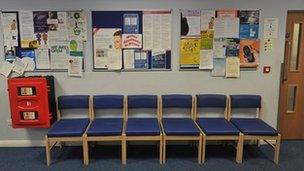Simple measures 'cut NHS missed appointments'
- Published

Missed appointments cost the NHS time and money
Measures as simple as getting patients to write down the time of their doctor's appointment themselves can cut non-attendance rates, a study suggests.
Patients who fail to attend NHS appointments cost the NHS about £700m a year, with up to six million appointment slots wasted annually.
But the Journal of the Royal Society of Medicine research found practices could cut this by almost a third.
Non-attendance is a major issue for the NHS, increasing waits and costs.
Studies have also shown that the missed appointments (called DNAs after Did Not Attend) can increase inappropriate and unnecessary A&E attendance.
While there can be many reasons for patients failing to attend appointments - including feeling better, transportation problems or being unable to get through to the surgery to cancel - the most common reason is that they simply forget.
'Pretty much costless'
The two Bedfordshire practices which took part in the study offered more than 10,000 nurse and GP appointments each month.
In the previous year, they had seen a total of 4,200 DNAs.
For one month patients were asked to write their appointment times down themselves. This was found to cut DNAs by 18% compared with the previous six months' average.
Asking patients who booked over the phone to repeat back the time and date of their appointments cut DNAs by 3.5% compared with the previous month.
GP practices tend to display notices stating how many people have missed appointments.
But this study showed this did not work as effectively as a more positive message.
Changing to posters stating how many patients had attended their appointments in the previous month, in combination with the other two measures, cut DNAs by 31%.
In order to check it was the measures that had made the difference, they were stopped for a month - and DNAs increased.
Steve Martin, the lead author of the paper - who has previously advised the Cabinet Office on how people can be persuaded or "nudged" to change their behaviour, said: "The measures we introduced were incredibly simple and pretty much costless to implement."
He said changing the emphasis of the posters was significant: "Displaying the number of people who haven't attended appears to encourage the practice. It normalises it - and clearly those people who don't turn up don't see it."
Debbie Wilkins, practice manager from the Wheatfield Surgery, Luton - one of those that took part in the study - said: "The fact that some patients make appointments and then don't attend is a constant concern.
"Our surgery tried out some behavioural methods and found that sometimes all it required was a rewording of posters or asking patients to repeat their appointment date and time.
"A person who does not attend clinics will be blocking appointments for other patients. In our time-poor NHS these quick and easy solutions to a constant concern are welcomed."
- Published19 November 2010